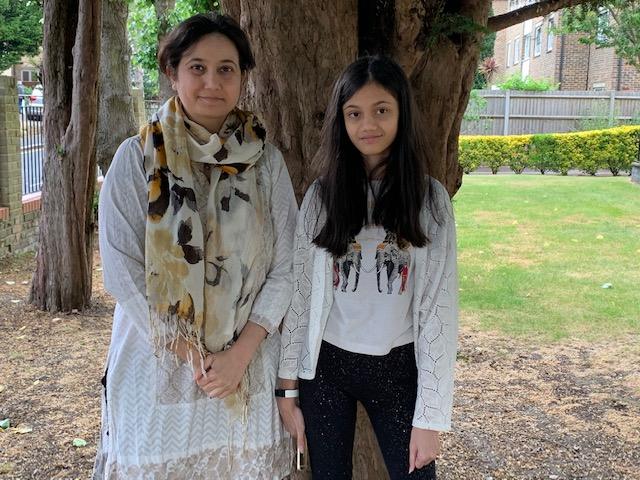The lockdown challenges of a 12-year-old with autism
- Published

Marium Ahmad says her autism has shaped her experience of the coronavirus pandemic
Marium Ahmad has spent time during lockdown looking at TikTok, reading up on her latest 'obsession' - star signs - and making packages for elderly care-home residents with her mum.
The 12-year-old, who has autism and chronic fatigue, describes herself as "more of an introvert" who likes staying in. When lockdown ends, she says "it will be a lot to take in" for her.
Autism can affect people's social interactions, but Marium says it also makes her "smart" and "honest."
"Autism is basically a condition where there are some things that you don't like," she says. "It can be sensory stuff, like noises or lights, it can be anything. Some things just trigger you and you don't like them."
'Makes me anxious'
Marium says wearing a face mask to stop the spread of coronavirus would be difficult for her.
"I don't like anything covering my face. It is part of my sensory challenges and makes me anxious," she says.
She also says she is "not a big fan" of crowds - and going out can be difficult.
Her mum Zainab, who home-schools her, says lockdown has made that worse: "With Marium's autism and chronic fatigue, rest is good... but she's out of practice in facing the world with outings... so it's literally [going to be] like teaching her how to ride a bike from scratch."
They both say the sense of community that comes with getting involved with volunteering opportunities locally in Wimbledon, south London, has been a big positive of lockdown.
As part of their project Awetisome.life, Marium fundraises, and has put together care packages. She donates gifts to autistic children, as well as to elderly care-home residents.

Marium Ahmad and her mum Zainab hope to support those with autism through their project Awetisome.life
"I like old people because I feel like I need to help them... I am not the most sympathetic person. A lot of my friends say... I am not very warm-hearted.
"But I can be... I have always liked old people," Marium says.
She was due to start at a specialist school in April, but lockdown changed her plans.
She says she found it difficult to study at a mainstream school, and that she didn't like the structure of classes there.
This partly helped specialists diagnose her autism. Her mum hopes to "do her best to ensure her physical health and anxiety are managed" as she prepares to go back to school.
Diagnosis delays
The National Autistic Society says there are 700,000 autistic people in the UK.
A spokesperson said: "If you're autistic, small changes and unexpected events can trigger intense anxiety. So the scale and pace of change over the past three months has been incredibly hard.
"Now we've started easing the lockdown and adjusting to the new rules, different anxieties will be creeping in.
"Do I have to go back to work? Should I send my child back to school? What if someone comes closer than two metres?"
Another issue is access to NHS healthcare.
Dr Shermina Sayani, a children's doctor specialising in development, says: "If you are a family waiting for an autism diagnosis, it may take longer to prioritise emergency work [because of the pandemic].
"The waiting list for diagnosis is quite long anyway because the process is complex. It often involves collecting information from the school, the nursery, as well as other professionals, possibly over time."
Dr Sayani works in the ethnically diverse borough of Newham, east London, and says an autism diagnosis can be challenging for some groups - even from a language perspective.
"There may not be a word in their home language for 'autism'. Sometimes, there are no cultural norms or history within the family to understand the diagnosis... in some cases, it may feel the diagnosis is taboo."
Marium moved from Pakistan to the UK to get more support for her health needs.
Zainab says it's been more difficult to get NHS referrals for Marium's chronic fatigue and heart condition POTS, because of the focus on the coronavirus pandemic.
But she and her daughter hope to take each day as it comes, and navigate lockdown together.
During this time, Marium has been following a number of people with autism on TikTok.
She says: "It helps me to understand I am not alone and there are people like me. It helps raise awareness and they're telling people what they need to hear about autism."